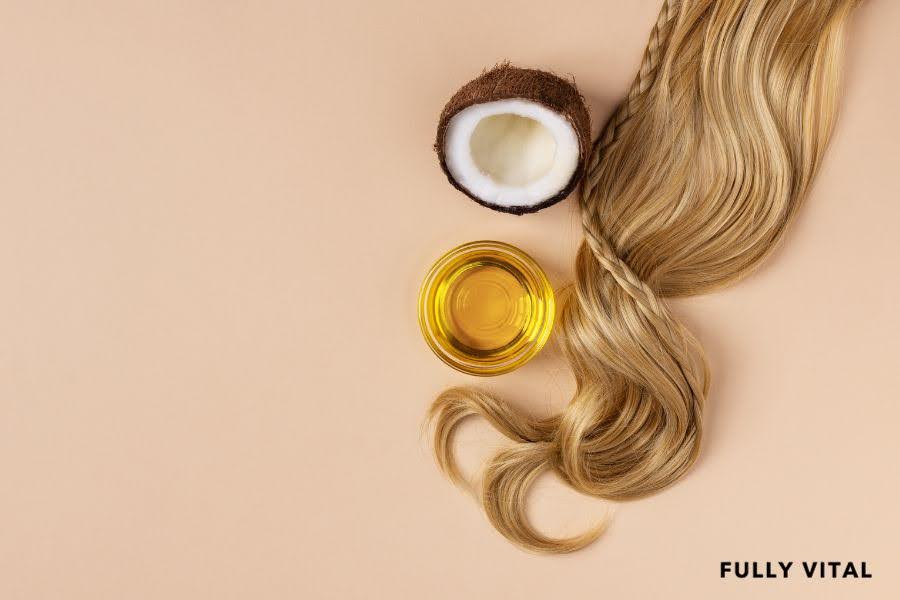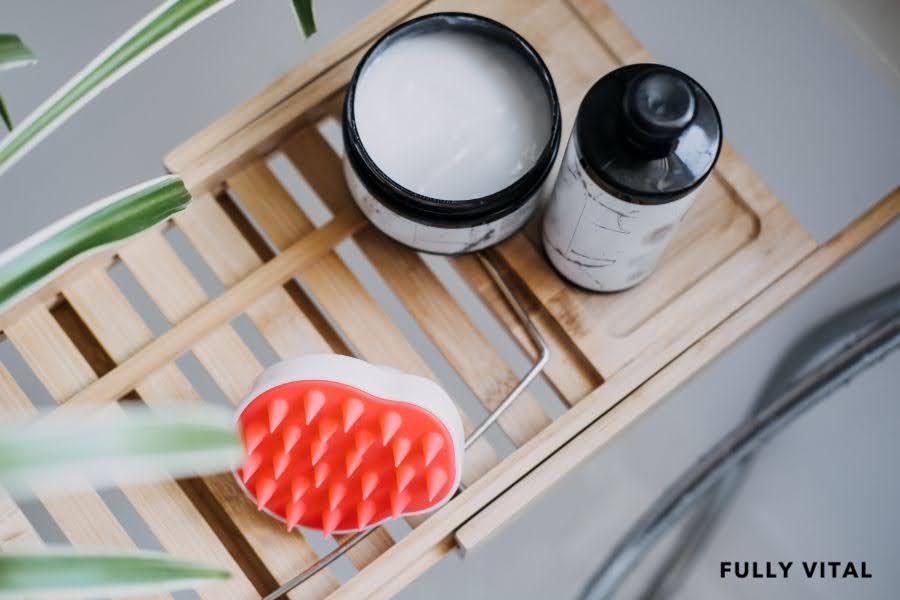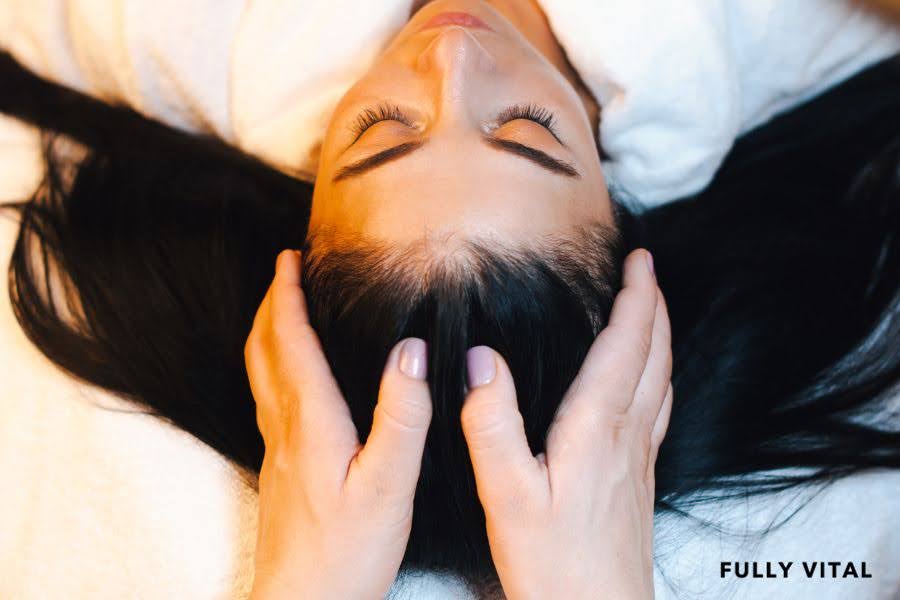
Nourish Your Hair Naturally: Coconut Oil Hair Mask Secrets
Maintaining healthy hair can often feel like you're navigating through a labyrinth of products and advice, all claiming to offer the secret to luscious locks.
Amid this complexity, one natural remedy has stood the test of time for its myriad hair benefits: coconut oil.
This article isn't just a rundown of coconut oil hair masks; it's a guide to naturally enrich your hair care routine with something that's more than just a fad.
We will explore how this tropical oil can nourish your strands, offer tips for crafting your own mask at home, and discuss how to apply it for the best results.
Along the way, we'll bust some myths and set realistic expectations for what coconut oil can (and can't) do for your hair.
Let's embark on your journey to healthier hair, naturally.
Explore the natural power of coconut oil for your hair and complement it with Fully Vital's hair growth solutions designed to nourish and stimulate your locks.

I LOVE MY HAIR NOW
FullyVital hair serum and hair vitamins made tremendous improvements in my hair. I truly love my hair now.
Shop Hair ProductsUnderstanding Coconut Oil And Your Hair
Coconut oil has gained popularity as a natural treatment for hair, and its benefits are attributed to its unique composition.
Here's an overview of how coconut oil can be beneficial for your hair:
What Makes Coconut Oil Special?
Coconut oil is really good for your hair.
It's like a special food that helps keep your hair healthy.
Coconut oil is different from other oils because it has a special kind of fat, mostly lauric acid.
This makes it really good at getting deep into your hair, not just staying on top.
So, it can make your hair moist and protect it from damage.
How Does Coconut Oil Improve Hair Health?
Coconut oil's deep conditioning properties stem from its ability to reduce protein loss in hair, a common culprit behind dull and weakened strands.
By replenishing hair's natural proteins, coconut oil can help maintain strength and elasticity.
Additionally, it's been suggested that when massaged into the scalp, coconut oil can also help to prevent dandruff, further contributing to overall hair health.
Preparing Your Coconut Oil Hair Mask
Creating a coconut oil hair mask is a simple and effective way to nourish your hair.
Here's a basic guide on how to prepare and use a coconut oil hair mask:
Selecting Quality Coconut Oil
To get the most out of your hair mask, start with the right foundation: high-quality coconut oil.
Look for unrefined (also known as virgin) coconut oil, as it retains the most natural benefits without being processed with chemicals.
Organic options are also a plus to ensure you're putting the most natural and toxin-free product on your scalp and hair.
The Right Mixture For Your Hair Type
Personalization is key when it comes to hair masks.
For those with oily hair, a lighter application is best to prevent excessive greasiness.
Dry, brittle hair, on the other hand, can benefit from a richer blend.
You can even boost the mask with other natural ingredients according to specific hair needs, such as adding honey for extra hydration or aloe vera for scalp soothing.
The goal is to create a formula that caters to your unique hair condition.
How To Apply A Coconut Oil Hair Mask Correctly
Applying a coconut oil hair mask correctly can maximize its benefits for your hair and scalp.
Here's a step-by-step guide:
Step-By-Step Application Guide
Using a coconut oil hair mask effectively requires more than just slathering it on your hair.
Begin by warming the oil in your hands or gently heating it to liquify.
Part your hair and apply the oil from the roots to the tips, ensuring that each strand is evenly coated.
For an even distribution, you can comb the oil through your hair.
To enhance the mask's penetration, cover your head with a shower cap and consider applying gentle heat with a hairdryer.
Timing And Frequency For Optimal Results
The duration of the hair mask can vary.
Leaving it on for at least 30 minutes can provide significant benefits, but for an intensive treatment, you might consider leaving it overnight—just be sure to protect your pillow with a towel.
As for frequency, once a week is a good starting point, but you can adjust depending on how your hair responds.
Too much coconut oil isn't always better; moderation is essential to prevent build-up.
Potential Benefits Of Regular Use
Regular use of a coconut oil hair mask can offer several benefits for your hair and scalp health.
Here are some of the key potential benefits:
Enhanced Hair Strength And Shine
Regular use of a coconut oil hair mask can transform your hair's texture, imparting a healthy shine and softer feel.1
This oil's deep conditioning effect helps to smooth the hair cuticles, which can reflect light better and give your hair a glossy appearance.
Additionally, by reinforcing the hair fibers, coconut oil helps in preventing breakage, making hair more resilient and less prone to damage.
Scalp Health And Hair Growth
A healthy scalp is the foundation of healthy hair growth.2
Coconut oil's antimicrobial properties can help maintain a clean scalp, potentially warding off bacteria and fungi that can lead to scalp conditions.3
Furthermore, the moisturizing effect of coconut oil could prevent scalp dryness and flakiness.
While coconut oil itself isn't a growth stimulant, by creating a healthier scalp environment, it could indirectly promote hair growth.

Combining Coconut Oil With Other Natural Ingredients
Combining coconut oil with other natural ingredients can enhance the benefits of your hair care routine.
Different ingredients can address various hair concerns, from dryness to lack of shine.
Synergistic Blends For Added Benefits
Coconut oil works well with other natural ingredients to address various hair concerns.
For instance, combining it with argan oil can amplify the moisturizing effect, while adding essential oils like rosemary can stimulate the scalp.
These combinations can create a synergistic effect for enhanced hair nourishment and care.
Diy Recipes For Specific Hair Needs
Creating a custom hair mask is simple and allows you to tackle specific hair issues.
Here are a few recipes:
- For dry hair: Mix coconut oil with avocado for a hydrating boost.
- For thin hair: Combine coconut oil with egg for a protein-rich mask that can add volume.
- For a sensitive scalp: Blend coconut oil with yogurt for a soothing and calming mask. These are just a few examples; the beauty of DIY masks is that you can experiment to find what works best for your hair type.
Realistic Expectations And Limitations
When using coconut oil hair treatments, it's important to set realistic expectations and understand the limitations of these natural remedies:
What Coconut Oil Can And Cannot Do
It's crucial to maintain realistic expectations about the benefits of coconut oil for hair.
While it's a fantastic conditioner and can improve hair's overall appearance and health, it's not a miracle cure for all hair issues.
Coconut oil can't reverse hair loss caused by genetic factors or repair hair that's been severely damaged by chemical treatments.
Think of coconut oil as a component of a broader hair care routine, rather than a standalone solution.
When To Seek Professional Advice
If you're experiencing ongoing hair problems or significant hair loss, it's important to consult a healthcare professional or a trichologist.
They can provide a diagnosis and recommend treatment options.
Coconut oil hair masks are a supportive natural remedy, but they're no substitute for professional medical advice when it comes to treating underlying health conditions.

Best Practices For Coconut Oil Hair Mask Use
Using a coconut oil hair mask effectively requires following certain best practices to maximize benefits and avoid any potential downsides.
Here are some tips to consider:
Dos And Don'ts
For the best outcomes with coconut oil hair masks, there are certain practices you should follow:
- Do conduct a patch test before applying coconut oil to your hair, especially if you have sensitive skin.
- Do start with a small amount; a little often goes a long way.
- Don't use coconut oil on your hair if you are allergic to it.
- Don't apply coconut oil too close to the scalp if you have fine or thin hair, as it might weigh it down.
Aftercare And Maintenance
After your hair mask session, washing out the coconut oil thoroughly is essential - residue can make hair appear greasy.
Use a gentle, sulfate-free shampoo to cleanse your hair and scalp, possibly shampooing twice if necessary.
Follow up with your regular conditioner, and let your hair air-dry when possible.
Regular trims and protection from environmental stressors will help maintain your hair's health after treating it with a coconut oil mask.
Experience the Power of Fully VitalAt Fully Vital, we are dedicated to providing you with the best hair growth products that are scientifically proven to deliver results. Here are some key features and benefits of our products:
With Fully Vital, you can trust that you are investing in the health and longevity of your hair. Say goodbye to aging hair and experience the difference with our powerful products. |
Final Thoughts On Coconut Oil Hair Mask
Coconut oil is more than just a kitchen staple—it's a versatile elixir for your hair.
With the ability to deeply moisture, strengthen, and add luster, coconut oil hair masks are a compelling choice for those seeking a natural approach to hair care.
But, the journey to fuller, healthier hair doesn't stop there.
Fully Vital understands that and offers a range of products to nourish hair from the inside out.
By implementing a coconut oil hair mask into your routine and possibly integrating Fully Vital's hair growth solutions, you equip yourself with a robust strategy for achieving the vibrant locks you desire.
Your hair is a crown you never take off; treat it royally with the natural power of coconut oil and the advanced care of Fully Vital.
Check out our recent blogs:
- From Runway To Reality: How To Nail The Layered Bob With Bangs
- Micro Bangs 101: Everything You Need To Know Before Getting Them
- Long Curtain Bangs: The Perfect Hairstyle For Women Of All Hair Types
Frequently Asked Questions About Coconut Oil Hair Mask
Can coconut oil actually help hair growth?
While coconut oil is not a direct stimulant for hair growth, it can create a conducive environment for healthy hair by nurturing the scalp and strands.
Its moisturizing properties reduce breakage and its antimicrobial properties help keep the scalp clean.
This combination can lay the groundwork for healthy hair, which could support better growth over time.
Is coconut oil suitable for all hair types?
Coconut oil has universal appeal due to its rich conditioning properties; however, the amount and frequency should be tailored to different hair types.
Individuals with fine or oily hair might find that smaller amounts are best to avoid a heavy feeling or greasiness.
Conversely, those with thick or dry hair might benefit from more liberal application to fully reap the moisturizing benefits.
How often should I use a coconut oil hair mask?
The ideal frequency depends on your hair's specific needs.
Starting with a weekly application is recommended, with adjustments made based on how your hair reacts.
If your hair feels weighed down or greasy, consider reducing the frequency.
On the flip side, if your hair is particularly dry or damaged, you might benefit from more frequent applications.
Can I leave a coconut oil hair mask on overnight?
Leaving a coconut oil hair mask on overnight can maximize deep conditioning benefits, especially for dry and damaged hair.
To prevent mess, it's vital to cover your hair with a cap and protect your pillowcase.
In the morning, thoroughly wash your hair to ensure no oil residue remains, which could make your hair look oily.
How do I wash out a coconut oil hair mask?
To remove coconut oil effectively, it may require two rounds of washing with a gentle, sulfate-free shampoo.
Applying a conditioner after shampooing can help to detangle and smooth your hair.
Avoid hot water, as it can strip your hair of its natural oils; instead, use warm water which can help dissolve the coconut oil without causing excess dryness.
Can I mix other ingredients with coconut oil for my hair mask?
Yes, enhancing coconut oil with other natural ingredients can target specific hair needs.
For instance, honey can add moisture for dry hair, while egg provides protein for strength.
Essential oils can provide a pleasant scent and have additional scalp and hair benefits, and avocado can enrich the mask with vitamins and fatty acids.
Will a coconut oil hair mask make my hair greasy?
Using the appropriate amount of coconut oil for your hair type and thoroughly washing it out should not leave your hair greasy.
If your hair tends to be on the oilier side, use coconut oil sparingly and focus on the ends of your hair rather than the scalp.
Regularly applying excessive amounts without proper washing could lead to build-up, resulting in a greasy appearance.
Can coconut oil repair damaged hair?
Coconut oil can strengthen hair and minimize damage by reducing protein loss and helping to maintain the hair's natural integrity.
However, it cannot reverse the effects of severe damage, such as that caused by over-processing or excessive heat.
In such cases, a haircut to remove split ends and a professional treatment plan might be necessary.
What type of coconut oil is best for hair masks?
The most beneficial type of coconut oil for hair masks is unrefined, also known as virgin coconut oil.
This form of oil maintains the most nutrients because it undergoes minimal processing.
Avoid refined oils, which are often stripped of many beneficial components during the manufacturing process.
Are there any side effects to using coconut oil on hair?
Coconut oil is generally well-tolerated; however, some individuals may experience an allergic reaction or sensitivity.
It's essential to conduct a patch test on a small area of your skin before applying it to your hair.
Also, using too much coconut oil or not washing it out properly can lead to build-up, which can attract dirt and result in a less clean scalp.
Sources:
- Apurva Dighe, & Barve, K. (2016). The Chemistry and Applications of Sustainable Natural Hair Products. In Springer briefs in molecular science. https://doi.org/10.1007/978-3-319-29419-3
- Trüeb, R. M. (2005). Dermocosmetic Aspects of Hair and Scalp. Journal of Investigative Dermatology Symposium Proceedings, 10(3), 289–292. https://doi.org/10.1111/j.1087-0024.2005.10118.x
- Shilhavy, B. (2004). Virgin Coconut Oil - How it has changed people’s lives, and how it can change yours! In Google Books. Sophia Media, LLC. https://books.google.com.ph/books?hl=en&lr=&id=dBTODRF0GnEC&oi=fnd&pg=PP6&dq=Coconut+oil+antimicrobial+properties+can+help+maintain+a+clean+scalp








